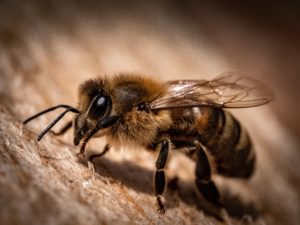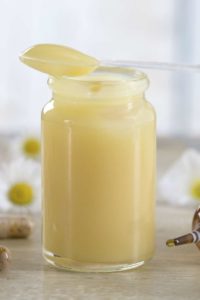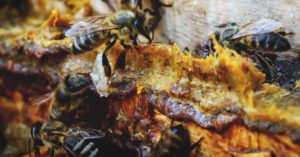The Honeybee
With the arrival of Pollinator Week, we aim to celebrate and share the importance of the pollinators that support and stabilize our entire ecosystem. For this post, we’d like to spotlight the honeybee!

The honeybee.
One of the most common bees in Maryland, the honeybee pollinates flowers, fruits, and vegetables. They are responsible for collecting pollen and nectar as food for their colonies. In fact, bee colonies produce substances such as honey to serve as food stores during the winter! Beating their wings over 200 times per second, honeybees use their strong sense of smell to communicate and recognize different types of flowers each day. They also use their antennae to taste and prefer to learn new scents and smells in the morning.
Fun fact: Honeybees do a dance to tell other bees the location of food, water, or a new home for the hive!
Although honeybees are mainly known for producing honey, they also produce substances such as royal jelly, propolis, and — of course — beeswax. These substances are used in various ways, ranging from supporting our immune health (royal jelly and propolis) to serving as an essential ingredient in cosmetics and body products, providing a safer and natural alternative ingredient to support healthy skin. For instance, beeswax is commonly used in products such as lip balm and candles. Check out the ingredients list for one of these products in your home, and you’ll most likely see it listed.
Royal jelly is used to feed the queen bee and the larvae. Secreted from the glands of worker and nurse bees, royal jelly is recognized for its milky white color and contains a variety of nutrients and antioxidant properties. Royal jelly is also used as an ingredient in wound healing and skin repair products; it’s also known as a nootropic!

Royal jelly in a glass jar.
Propolis is used by the bees to construct hives and is created by the bees mixing their saliva with beeswax. However, propolis is also a known substance that is beneficial for immune health and wound healing. It has a long history of use and is commonly found in natural health food stores across the country. You can typically find propolis sold in stores as a throat spray or in a capsule blend with royal jelly and other health-supporting ingredients.

Bees use propolis to construct a hive.
Honeybees are attracted to plants such as lavender, echinacea, California poppies, marjoram, sage, oregano, and yarrow. Be sure to visit our Home Gardens page to learn more about incorporating pollinator-friendly plants in your garden!
Learn more about the honeybee by visiting these links below:
